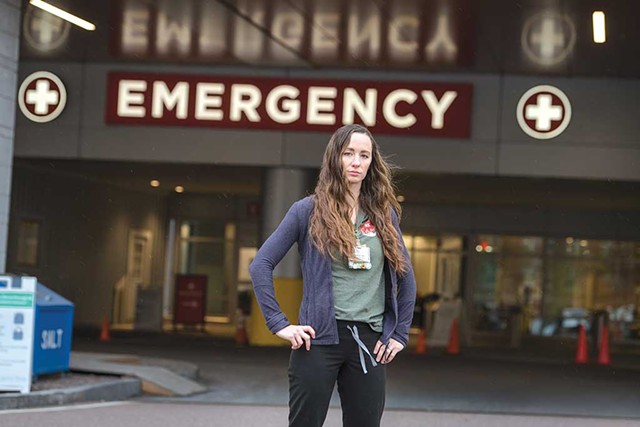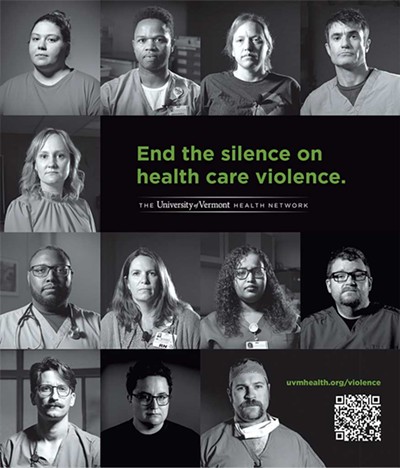
- Daria Bishop
- Karah Newman
The people who work in Vermont's busiest emergency department have been punched in the face. They've been bitten, stabbed with kitchen shears and battered with metal food trays. They've had their lips split open, noses broken and eyes blackened.
Working in an emergency room always comes with risk. But as hospitals have absorbed the swell of humanity ill-served by so many other struggling systems of care, staff at the University of Vermont Medical Center say they have endured violence of a severity and frequency that is unprecedented — and unsustainable. The escalating threats have led many to consider leaving their jobs. Some already have.
Emergency department workers began raising alarms during the pandemic about the dangers they face. The UVM Medical Center responded by installing a metal detector and beefing up the presence of security guards. It also lobbied lawmakers for heightened legal protections.
Now, hospital officials are embarking on a public awareness campaign about the unacceptable perils of emergency care. Last month, a video produced by the UVM Health Network featuring testimony by its workers was featured on the New York Times website as part of an op-ed. The hospital followed up with a print and online campaign in local media calling for an end to the "silence on health care violence." Overnight, Vermont's only level-one trauma center became the face of a nationwide problem.
A rash of physical assaults in 2020 spurred the UVM Medical Center to start collecting better data on workplace violence. Staff members have reported more than 2,100 incidents since the start of 2021, according to the hospital. The vast majority have occurred in the emergency department, where employees treat patients who are in the throes of drug withdrawal, severe pain and psychiatric crisis.
"All my friends have been assaulted," said Joey Miller, a mental health technician who works in the emergency room. Miller, who provides one-on-one supervision of psychiatric patients, said he has been spit on, kicked, scratched and threatened with a knife. Two years ago, a patient broke Miller's hand. When he returned to work weeks later, still wearing a soft cast, he had to restrain someone who attacked three of his colleagues. He went home that day with a scratch across his face.
"I've never been bitten, which is very lucky and exceptional in my role," Miller said.
Longtime medical workers say violent incidents spiked as the pandemic waned and emergency departments became busier than ever. The UVM Medical Center now sees between 200 and 220 emergency patients most days, a 10 to 20 percent increase compared to the pre-COVID-19 figure. That's led to longer wait times and more frustration.
There's also been a startling rise in the number of patients who are in psychiatric crisis. Some days, half of the ER's 45 or so beds are occupied by mental health patients, who can be confused, scared and prone to outbursts. They often stay for days while awaiting transfer to one of Vermont's few inpatient psychiatric units. The hospital has had to restrain patients far more often, at least once a day on average, data show.
Staff members say more patients seem to be arriving under the influence of alcohol or drugs that can cause paranoia or aggression.
But not every incident can be blamed on substance use or mental illness, according to Matt Looft, a charge nurse. Some people who have assaulted staff members have been fully aware of their actions and the potential harm.
"We care for people who are in crisis. We see people on their bad days," Looft said. "Often, that agitation or vulnerability is magnified and can spill over in unexpected, uncharacteristic ways, like violence."
The impact on workers isn't just physical. The rising violence has added to a growing sense of burnout among emergency room staff, who were also on the front lines of the pandemic. It's also changed the way people approach their jobs.
After suffering a broken nose at the hands of a patient last year, nurse Karah Newman felt herself panicking whenever a patient became agitated. She now tries to keep her distance from patients who show signs of aggression and strives to have other people in the vicinity whenever possible.
"I want to care for my patients and do what I can to make them better," Newman said. "But I'm not going to put myself in harm's way anymore."
Vigilance can come at the expense of patient care. As a medical technician, Alex Dees works closely with people when they first arrive: He starts IVs, draws blood, takes them to imaging. Connecting with patients can be one of the best parts of his job, he said. But it can be hard at times to "explain what you're doing, when in the back of your mind you're thinking, This could go south at any moment."

- Courtesy
- One of the UVM Health Network ads
Staff members said they know several colleagues who have left the hospital in the past few years because of the violence. One is a psychiatric nurse named Lindsey, who asked that her last name be withheld because years of verbal threats have left her concerned for her safety.
The 34-year-old worked in a Baltimore hospital for years and said she never felt concerned about being assaulted there. COVID-19 hit shortly after she came to Burlington, and patients started acting more aggressively.
One day, she had a panic attack after a patient punched her in the head. In the aftermath, racing thoughts kept her up at night and a knot of anxiety formed in her chest on the way to work each day. She began arriving an hour early so that she had time to mentally prepare herself. She lost weight, enough for her friends to wonder whether she had an eating disorder.
She stuck it out for as long as she could, but at her husband's urging, Lindsey left the hospital in August 2020 for a job with the state health department. She has since joined an outpatient addiction treatment clinic, where she's working with patients again.
"I feel like I'm helping again, as opposed to being a punching bag," she said.
Emergency room staff believe violent patients aren't always held accountable. Some workers say they have pressed charges against assailants only to see the case go nowhere. At a press conference about workplace violence last year, nurses called out Chittenden County State's Attorney Sarah George, accusing her of not pursuing cases involving assaults on their colleagues.
George spoke to the nurses later that day and said the specific incidents they were referring to had never been filed with her office. She said there appeared to be a disconnect between her office and the Burlington Police Department, whose officers were choosing not to file charges against certain violent patients in the apparent belief that she would not prosecute them. Police Chief Jon Murad did not respond to requests for comment.
In an interview last week, George said she has met with emergency room staff every few months since summer 2022 to hear about their experiences and keep them updated about pending cases. She's also told her staff to make sure she personally handles any case that involves an assault on a health care worker.
The cases aren't always straightforward. In the 30 or so involving assaults on health care workers in the past three years, many defendants have been ordered to undergo competency evaluations, suggesting their mental status was in question.
That includes a St. Johnsbury man accused of punching an ER employee while waiting to be admitted to an inpatient psychiatric unit last week. Police had brought the man to the hospital the previous night after he allegedly broke into a Burlington apartment through a fire escape, locked himself inside and took a shower. He was naked when police arrived, and he appeared to be under the influence of drugs — psychedelic mushrooms, he claimed.
There have also been reporting delays. Last week, George said she recently received three cases involving assaults at the hospital, including one in early July. It's unclear why it took the police department so long to send it.
Back at the hospital, ER workers say management appears to be taking their concerns seriously.
Under their recently negotiated new contracts, support staff members who witness or experience a violent attack can ask for time off to recover. The hospital must pay them for any hours they miss on the day of the incident and then allow them to take either unpaid leave or use their accrued time off. The collective bargaining agreements for nurses and resident physicians do not contain such language, but the hospital says it tries to accommodate them whenever possible.
Meanwhile, the security team has a greater presence in the ER. The metal detectors — which sometimes collected dust for lack of staff — now operate around the clock, and visitors can only bring in transparent bags. The hospital has confiscated nine guns and nearly 1,500 knives this year.
The hospital now provides "security carts" that contain protective gear, such as penetration-resistant gloves and swim caps meant to prevent hair-pulling, that staff can put on when patients get out of control. And the hospital is training more people on de-escalation tactics. Miller, the medical technician, recently left that job to take another full-time position with the hospital providing those trainings. "In every area of the hospital, people are taking workplace violence more seriously," he said.
Among them are members of the UVM Health Network's communications department, which is spearheading the public awareness campaign. The idea came about in the spring as the comms team brainstormed ways to support its clinical colleagues, according to hospital spokesperson Annie Mackin.
Comms employees shot a similar video from inside the intensive care unit during the height of COVID-19, in a plea for people to get vaccinated. With help from clinical leaders in the ER, Mackin said, they filmed the video and sent it to the Times. Staff at the paper helped edit it.
The hospital has spent about $23,000 on the campaign thus far. The goal was to prompt a "local and national" conversation about the issue, Mackin said. It appears to be working: The video, produced by Ryan Mercer and Roland Kielman, has been played 1.5 million times on the Times website, Mackin said, and another 500,000 times on the hospital's Instagram account.
As for the overall message, Mackin said, it was quite simple: "The hospital has a big role to play in keeping people safe, but, just like with COVID, the community has a role, too."
It's a small gesture, but one workers say they appreciate.
"We're the backstop, and we're asking for help," said Dees, the mental health technician, "even if that's just people understanding what we're going through."









Comments
Comments are closed.
From 2014-2020, Seven Days allowed readers to comment on all stories posted on our website. While we've appreciated the suggestions and insights, right now Seven Days is prioritizing our core mission — producing high-quality, responsible local journalism — over moderating online debates between readers.
To criticize, correct or praise our reporting, please send us a letter to the editor or send us a tip. We’ll check it out and report the results.
Online comments may return when we have better tech tools for managing them. Thanks for reading.